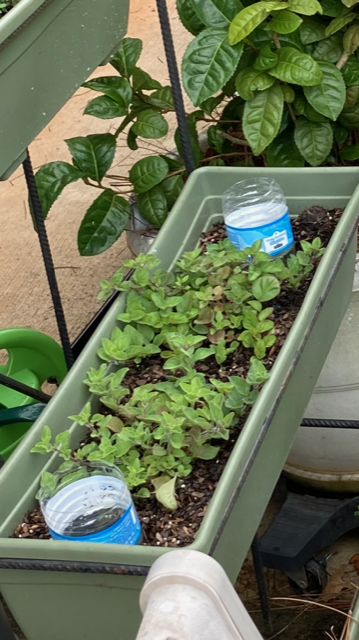
Oregano
Oregano is a creeping herb in the mint family. Its wide culinary use makes it a versatile herb!
|
Greek |
|
Greek: Origanum heracleoticum Italian: Origanum vulgare |
|
Easy |
|
Easy |
|
2-4 years if properly stored |
|
Perennial |
|
7-14 days |
|
None |
|
Surface Sow |
|
up to 18” x 18” |
|
Seeds need light for germination Full sun |
|
90-200 days |
|
March, April, and May |
|
Yes |

Growing Tips


When to Start
Spring: Start indoors 6-8 weeks before the danger of frost has passed.
Direct Sow: Direct sow after the danger of frost has passed.
Transplant: after the danger of frost has passed (May 1 for GA).
Start indoors 6-8 weeks before the danger of frost has passed. Gently press the seeds into the seed starting mix and place them under grow lights as light helps germination. Or direct sow by gently pressing the seeds into the soil (they can be covered with a fine layer of soil to keep the seeds from blowing away) after all danger of frost has passed. Transplant after hardening off and all danger of frost has passed. Plant or transplant into full sun beds or containers. Space or thin to 8-12 inches apart. Keep the soil moist but not soggy. After the winter is over and new growth has started, remove old dead stems. Oregano dislikes very acidic soil. It prefers soil with a pH of 6.8-7.8. This can be easily achieved by planting in containers and using compost, potting, or garden soil.
Harvest in the morning for peak flavor. While oregano can be harvested anytime during the growing season, the leaves are the most flavorful right before the plant blooms. Harvest little and often to encourage the plant to keep producing.
It has a wide range of uses. It is used as a flavoring in tomato and spaghetti sauces. And it enhances the flavor of meat, vegetable, and fish dishes. It is even used in potpourri.
Care
Harvest
How to use
Pro Tip!
Incompatibles: None
Grows well with: All beans, cucumber, and squashes (Both summer and winter varieties.)
My personal experience
I grow oregano every year. My favorite variety is Greek. It is my preference to start it from seed every year versus letting it over winter. As a 2-year-old plant, it tends to be more woody. So, I treat it as an annual.
I grow 2 seedlings and they spread and take over the window box. I water it every morning, as it’s in a container and will dry out more quickly. I also make use of water bottle reservoirs to help it get through the hot summer days. I’m constantly harvesting and drying it for use during the winter months.
Pictured to the right is my Greek Oregano with watter bottle reservoirs.

Seed Saving

Isolation Distance
Insect pollinated, isolate 1/2 mile to maintain seed purity.
Instructions
Harvest the flowers as they begin to dry. Oregano flowers will not all dry at the same time, so keep a close watch to make sure they don’t drop seeds before you’ve collected them. Cut the flower off the plant. It is best to cut the flower off, rather than pull it. This is because the seeds will be dried out and any sudden movements could cause them to fall out.
Secure flower heads in bundles using string or rubber band and hand upside down to dry for 2-3 weeks. Place something, like a plate, underneath the bundles to catch any seeds that may fall during this stage.
Once the flowers have completely dried, place them in a paper bag. Shake flower heads in the bag to free any seeds still in the flowers. Pour seeds and chaff onto a plate and separate seeds from the chaff. Use your fingers to spring and lose any remaining seeds that did not come out when you shook the flow.
Store seeds in labeled, seed bags and place them in a dry and cool location.
Features
- Frost tolerant
- Container friendly
Greek: One of the best varieties for culinary use. Great for tomato sauces, vegetable stews, and meat and chicken dishes. It is savory and earthy with peppery notes. It does well in dry soil.

Oregano dislikes very acidic soil. It prefers soil with a pH of 6.8-7.8. This can be easily achieved by planting in containers and using compost, potting, or garden soil.
Harvest in the morning for peak flavor. While oregano can be harvested anytime during the growing season, the leaves are the most flavorful right before the plant blooms.
Harvest little and often to encourage the plant to keep producing.
To dry the oregano, wash the leaves and remove any bad spots. Hang upside down in a cool dry place until the leaves are crunchy. Usually, this takes about a week. Remove leaves and store them in a labeled air-tight container.
You May Also Like:
Source:
The New York Botanical Garden, Herbal Handbook, Clarkson Potter.
